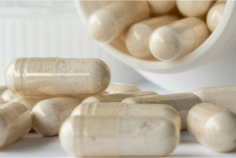Dietary deep dive: Probiotics
Posted on March 28, 2024 in Healthy You

When most people think of probiotics, the first thing that might come to mind is gut health. But have you ever wondered if "good” bacteria can also impact your smile?
Probiotics, which are live microorganisms, have gained in popularity in recent years, and they may have benefits for oral health. But because there haven’t been many research studies on this area of nutrition, navigating the world of probiotics can be confusing. Here, we explore some important things to know about probiotics to help you make informed choices for your oral health.
Probiotics: Balancing bad bacteria with good bacteria
Our bodies are full of bacteria, both good and bad, forming the microbiome. In your mouth, probiotics may offer benefits because good bacteria may play a role in preventing the growth of too much harmful bacteria. Too much bad bacteria in your mouth can lead to bad breath, gingivitis and even tooth decay.
Where do probiotics come from?
Some foods contain probiotics naturally, such as kombucha, sauerkraut, yogurt, kimchi and tempeh. Probiotics are also available as supplements (options include capsules, powders and liquids). However, specific strains and dosages in supplements may not always mirror those found in food sources, and supplements are not regulated by the U.S. Food and Drug Administration (FDA), so food sources are the ideal choice for probiotics.
A healthier mouth with probiotics?
Although there isn’t a lot of research findings on the topic of probiotics and oral health, some studies suggest potential dental benefits, including:
- Fresher breath: Too much bad bacteria in your mouth may cause bad breath. Probiotics can combat that bad bacteria, leading to fresher breath.
- Reduced symptoms of gum disease: Some research suggests probiotics might help reduce inflammation and tenderness associated with gingivitis.
- Fewer cavities and plaque: Good bacteria may help protect tooth enamel (the outer coating of your tooth) by limiting the growth of harmful bacteria that contribute to plaque and cavities.
Cons of probiotics
Probiotics are generally considered safe, but potential side effects like allergic reactions, bloating and diarrhea can occur, especially if you take them while you’re sick or if you have a compromised immune system. Additionally, probiotic supplements are not regulated by the FDA, so it’s important to talk to your doctor before using them.
With probiotics, go for food first
It’s often tempting to reach for a supplement as a magic pill, but remember that most people can get all the good bacteria they need through a balanced diet rich in fiber and fermented foods. While probiotics may offer additional benefits, they should not replace a healthy lifestyle and twice-yearly dental visits. Your dentist is a great source of information regarding diet and lifestyle choices to boost your oral health. If you need to find a new dentist, use Delta Dental of Iowa’s online Find a Provider tool to find an in-network dentist in your neighborhood.
REFERENCES:
National Library of Medicine
University of Texas MD Anderson Cancer Center